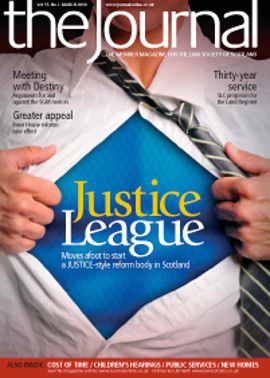End o' anither auld sang?

At one level the two recent decisions from the UK Supreme Court, Allison v HM Advocate [2010] UKSC 6 and McInnes v HM Advocate [2010] UKSC 7, may be seen to be of importance strictly to Scottish criminal practitioners (and their clients) in resolving specific technical legal issues relating to Crown duties of disclosure and the consequences of any breach thereof. But these cases also, it is suggested, mark an important constitutional development. They may be said to consolidate a general appellate jurisdiction in Scottish criminal cases in a court situated outside Scotland with non-Scottish judges among the bench hearing the appeal.
In apparent response to criticisms from the criminal appeal court (notably in Fraser v HM Advocate (No 1) 2008 SCCR 407 (at paras 219-220), the UKSC in McInnes seems to have assimilated the statutory test of “miscarriage of justice” under s 106(3) of the Criminal Procedure (Scotland) Act 1995, which the Scottish appeal court applies in considering appeals, with the legal test which the UKSC is usually tasked to apply in Scottish criminal appeals, namely whether or not there has been a breach of the duties imposed on the Crown in Scotland under article 6 ECHR such as to result in an “unfair trial”.
Further, in contrast to the position in the rest of the UK, it is the UKSC rather than the appeal court in Edinburgh which has the last word as to whether a Scottish criminal appeal will be heard in London. In criminal cases before the Court of Appeal of England & Wales and the Court of Appeal of Northern Ireland, it is only possible for an appeal to be taken to the UKSC if the appeal court below certifies that the appeal raises a point of general public importance. The UKSC has no locus to review any refusal by the appeal court to make such certification. By contrast, if the Scottish appeal court refuses leave to appeal a devolution issue to London, the UKSC has power to overrule this refusal and itself grant the applicant special leave to appeal under para 13 of sched 6 to the Scotland Act 1998.
How has the independence, the splendid isolation or crabbed insularity (depending on one’s perspective) of the Scottish criminal justice system been brought to an end, some 300 years into the Union in which there had simply been no possibility of any criminal appeals from Scotland to London? It has not been by way of express legislative fiat but, instead, is the result of a series of apparently small – and not always consistent – steps taken over the past 10 years by the Judicial Committee of the Privy Council, and now by the UKSC, in individual cases in the exercise of its devolution jurisdiction.
These steps in the evolution of the devolution jurisdiction of the Privy Council, and now the UKSC, mean that there are few, if any, criminal cases in Scotland in respect of which the London based court may not now claim jurisdiction – whether on an accused’s appeal or that of the Crown – and pronounce a remedy, affirming, modifying or overturning the decision of the Scottish criminal appeal court. At the moment it seems to be only the judges in Scotland who have expressed their opposition to this development (in their submission to the Calman Commission on Scottish devolution).
The intellectual calibre and experience in the criminal law of Scotland of the two Scottish Justices who currently sit on the UKSC (Lord Hope and Lord Rodger) is unrivalled. Yet what has now been crafted is an institutional change which opens up Scottish criminal law and procedure to external scrutiny by other judges untrained in Scots law who will make up the majority in most appeals to London.
In McInnes Lord Brown surveyed the parallel English law on the issue which was before the UK Supreme Court and stated (at para 36):
“This, I apprehend, would be the position in English law (both as to the test to be applied – in England as to whether the conviction under appeal is unsafe – and as to the decision being one for the appeal court itself) and I can see no good reason why it should be any different under Scottish law.”
Lord Brown’s remarks indicate that, notwithstanding that the UKSC Justices were careful in McInnes to emphasise that they were considering and applying only Scots law in the appeal, there will be increasing pressure towards harmonisation in criminal law and procedure as between Scotland and the rest of the UK when criminal appeals from Edinburgh come to London. It is not self-evident that this should be a matter for any great regret. And in the light of the creation of a common area of freedom, security and justice throughout the EU – in which “the approximation of criminal laws” may come about (article 67(3), Treaty on the Functioning of the Union) – the case for a continuing, distinctively Scottish legal nationalism has to be positively argued, not presumed.
In this issue
- When is oppression not oppression?
- PAYE penalties – another trap for employers
- Future on the line
- End o' anither auld sang?
- Rights team
- House prices rising – official
- ABS: time to decide
- Streamlining the Inner House
- When cash is king
- The shape of things to come
- Effective participation?
- Keeping tabs on the EU
- How to survive and thrive - read on
- Law reform update
- All-round support
- Family business initiative progresses
- From the Brussels office
- World IP Day approaches
- Going beyond 2010
- Need life be a pressure cooker?
- Ask Ash
- Target practice
- The essence of victim
- Moved with e-motion
- Precious words
- The future of crofting
- A clash of cultures
- If it sounds too good to be true...
- Website review
- Book reviews
- Services transformed
- Consumer Code for Home Builders
- Estate agency fixed fees: the way ahead?






